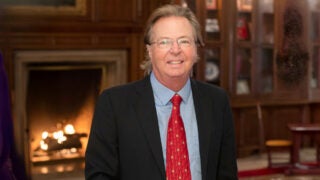
Marty Sargeant (left) is CEO of Keck Medical Center of USC; Rodney B. Hanners is CEO of Keck Medicine of USC. (USC Photo/Brian van der Brug)
From submarines and F-15s to leading roles at Keck Medicine of USC
Veterans Day is deeply meaningful to Rodney B. Hanners and Marty Sargeant, whose military service has shaped their careers as leaders.
Rodney B. Hanners and Marty Sargeant agree that one of their favorite occasions on USC’s Health Sciences Campus is the annual catered lunch on Veterans Day with staff members who are fellow military veterans.
“It’s an amazing common thread,” said Sargeant, CEO of Keck Medical Center of USC and a former F-15 fighter pilot in the U.S. Air Force. “You get to hear about their experiences, to hear about their passion, and about how they treat Keck Medicine the same way they treated their daily lives when they were in the military.”

Sargeant and Hanners, who is CEO of Keck Medicine of USC, shared their feelings about Veterans Day and how their past military service helped shape them as leaders during a recent interview at the new outdoor Tranquility Terrace located beside the Norris Healthcare Center.
For Hanners, a former officer in the U.S. Navy submarine force, Veterans Day never fails to give him an immense sense of pride. But he said he often experiences those same feelings in everyday life.
“If I’m at a Dodgers game or any sports event and they sing the national anthem, there’s a certain pride that jumps out of you,” Hanners said. “It comes with being a veteran and being part of a tribe and from all that we’ve sacrificed for the country and for our freedom.”
The road to Keck Medicine of USC
Hanners, who joined Keck Medicine of USC 10 years ago, is responsible for oversight of USC’s clinical activities, including USC Care Medical Group and the Keck Medical Center of USC. The university’s health enterprise also includes Keck Hospital of USC, USC Norris Cancer Hospital, USC Verdugo Hills Hospital and USC Arcadia Hospital, in addition to more than 67 outpatient clinics from Bakersfield to Newport Beach.
He said his military training gave him a foundation that has served him well in various leaderships posts throughout his career.

“One of the things that was very much drilled into us from day one was integrity,” Hanners said of his military service. “You’ve got to have integrity, own up to your mistakes, learn from them. It’s all part of the deal.”
Sargeant had more than 20 years of health care leadership experience prior to his current role providing executive leadership for Keck Hospital and USC Norris Cancer Hospital.
He described part of his leadership philosophy as “knowing that it’s not the rank that you may have held in the military, but who you are as a person and your ethos.”
Unexpected careers in the military
Neither Hanners nor Sargeant grew up in military families. Likewise, neither considered the service until they got to their respective colleges.
As a student at California State University, Long Beach, Hanners planned to work in the aerospace industry post-graduation. He pivoted after having a fateful meeting with Navy recruiters who visited his college campus.
“It seemed fun; it seemed exciting,” he said of the Navy. “It was submarines. It was nuclear. It was all of that. I had previously been on a path that wasn’t going to be very satisfying to me.”
Hanners served six years in the submarine force and was selected as the Submarine Group 5 junior officer of the year.
He continued his education at the Navy’s Nuclear Power School, where he studied nuclear engineering and later completed the Advanced Leadership Program at The University of North Carolina at Chapel Hill’s Kenan-Flagler Business School.
“Leadership is a big deal in the military,” Hanners said. “They put a lot of time and energy into building your leadership, your ability to make decisions quickly and your ability to recognize when you’re in a worse situation.”
Sargeant said an unexpected and “overwhelming sense of purpose” while on a walking tour of Virginia Military Institute led him to the Air Force.
“Because it’s a military college, it struck me at that moment that this is something I’ve got to fulfill,” he said.
After graduation, Sargeant served for 10 years as an F-15 combat fighter pilot in the Air Force and received two medals of commendation. He was also a flight instructor and wing scheduler before returning to school at the Weatherhead School of Management at Case Western Reserve University, where he earned an MBA in finance and health systems.
“People grow up pretty quickly in the military,” he said. “There’s a sense of responsibility that you get early on and a sense of accountability. There is focus on the mission, focus on the goal and not getting distracted. All those things, I think, play out with those who have served.”
“I really would not have changed any of that experience for the world.”



